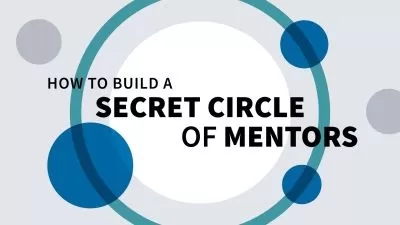Certified Leadership Coaching Conversations Program (CLCCP)
International Institute of Excellence & Effective Leadership (IIEEL)
3:01:29
Description
Demonstrate appropriate & effective strategies when engaging in coaching conversations & use feedback loop effectively.
What You'll Learn?
- Review two common types of coaching conversations & Differentiate between a developmental coaching approach and a directive management conversation
- Select strategies for both mindset and skill set coaching & Identify mindset and skill set gaps in employees
- Analyze scenarios of employee performance gaps & Breakdown additional strategies for skill set coaching
- Describe how to use feedback loop in coaching conversation
- Review Review how to with difficult colleagues and coaching a fellow coach
- Interpret how to empower your employees to deal with their problems through coaching
- Demonstrate use of good questioning techniques and use of Thought Model
- Apply coaching techniques you know and use when coaching another coach-manager
- Demonstrate your ability to coach someone effectively
Who is this for?
What You Need to Know?
More details
DescriptionCertified Leadership Coaching Conversations Program (CLCCP)
By the end of this course, you will be able to demonstrate appropriate and effective strategies when engaging in coaching conversations with those that you lead. By exploring and analyzing common coaching scenarios that are acted out in this course, you will have a great sense of what works well and not so well during such a conversation. Specifically, you'll be able to better differentiate between a developmental coaching approach and a directive management style, discuss new strategies and techniques for dealing with both mind set and skill set gaps, describe how to use the feedback loop effectively in a conversation, and demonstrate the use of good questioning techniques and the thought model to not only help an employee identify issues, but help the employee really change their thinking.
Missing Deadlines and Dealing with Change
In this first module of coaching conversations, we're going to focus on two common coaching conversations - an employee who consistently misses predetermined deadlines, and an employee dealing with a process change. By the end of this module, you should be able to differentiate between a developmental coaching approach and a directive management conversation, suggest strategies for both mindset and skill set coaching, and identify mindset and skill set gaps in employees. After a short introductory video, you will watch both an ineffective example, and effective, model example of how each type of conversation should be handled; we will wrap up each lesson with an in depth review and analysis of both the ineffective example and the effective example before you have the opportunity to check your understanding of the material.
Former High Performer & Consistently Late to Work
In this next module we'll focus on an employee who is a former high performer who is experiencing a skill set gap and an employee who is consistently late to work. By the end of this module you should be able to articulate some additional strategies for skill set coaching, such as peer mentoring, as well as be able to describe how to make use of the feedback loop in a coaching conversation. As in Module 1, after a short introductory video, you will watch both an ineffective example, and effective, model example of how each type of conversation should be handled. Then we will wrap up each lesson with an in-depth review and analysis of both the ineffective and effective example. A quiz at the end of the module will allow you to assess your understanding of the material.
Dealing with Difficult Colleagues & Coaching the Coach
In our last module covering techniques and strategies in common coaching conversations, we're going to go over how to coach someone who is dealing with difficult colleagues as well as how to coach a fellow coach-manager. In this module, you'll learn how to empower your employees to deal with their own problems (instead of fixing them for your employees) through coaching, be able to demonstrate the use of good questioning techniques and use of the Thought Model to not only to help identify issues but to help the employee come up with new solutions and thoughts, and, finally, how to apply coaching techniques you already know and use when coaching another coach-manager. We'll also discuss the importance of coaching the person in the room. As you're reviewing this material, think about how you can apply the strategies you learn in these videos to your coaching practice.
Key Takeaways for Effective Coaching
Before moving on to this course's specialization milestone, we're going to step back a bit and take a look at some final items to consider as you really begin to put everything you've learned throughout the specialization into practice within your organization. You'll be able to relate the importance of identifying an employee's thoughts, acknowledging an employee's strengths along with what needs to be worked on when coaching, making sure that an employee buys into the process and actually wants to participate in a coaching conversation. We'll wrap up with talking about how, like any skill, coaching takes practice, and making mistakes is part of the learning process.
Milestone 3: Demonstrate Your Ability to Coach Effectively
In this final module, it's time to actually prep for and have some coaching conversations. This is a true test for yourself to see how far you've come in this specialization and will help you reflect on areas in which you're already doing well and areas where you still may need a little work. This module contains an overview video discussing key ideas to consider when working on the milestone, as well as some review videos from earlier courses in the specialization that should help you as you work on the assignments related to this milestone. Good luck!
Who this course is for:
- Line managers and Supervisors who manage teams both in Service and Manufacturing industries
- Executives and Senior Management personnel who want to drive transformation of manager to coach
- All Human resources personnel or HR Business Partners facilitating the Manager to Coach Transformation programs
Certified Leadership Coaching Conversations Program (CLCCP)
By the end of this course, you will be able to demonstrate appropriate and effective strategies when engaging in coaching conversations with those that you lead. By exploring and analyzing common coaching scenarios that are acted out in this course, you will have a great sense of what works well and not so well during such a conversation. Specifically, you'll be able to better differentiate between a developmental coaching approach and a directive management style, discuss new strategies and techniques for dealing with both mind set and skill set gaps, describe how to use the feedback loop effectively in a conversation, and demonstrate the use of good questioning techniques and the thought model to not only help an employee identify issues, but help the employee really change their thinking.
Missing Deadlines and Dealing with Change
In this first module of coaching conversations, we're going to focus on two common coaching conversations - an employee who consistently misses predetermined deadlines, and an employee dealing with a process change. By the end of this module, you should be able to differentiate between a developmental coaching approach and a directive management conversation, suggest strategies for both mindset and skill set coaching, and identify mindset and skill set gaps in employees. After a short introductory video, you will watch both an ineffective example, and effective, model example of how each type of conversation should be handled; we will wrap up each lesson with an in depth review and analysis of both the ineffective example and the effective example before you have the opportunity to check your understanding of the material.
Former High Performer & Consistently Late to Work
In this next module we'll focus on an employee who is a former high performer who is experiencing a skill set gap and an employee who is consistently late to work. By the end of this module you should be able to articulate some additional strategies for skill set coaching, such as peer mentoring, as well as be able to describe how to make use of the feedback loop in a coaching conversation. As in Module 1, after a short introductory video, you will watch both an ineffective example, and effective, model example of how each type of conversation should be handled. Then we will wrap up each lesson with an in-depth review and analysis of both the ineffective and effective example. A quiz at the end of the module will allow you to assess your understanding of the material.
Dealing with Difficult Colleagues & Coaching the Coach
In our last module covering techniques and strategies in common coaching conversations, we're going to go over how to coach someone who is dealing with difficult colleagues as well as how to coach a fellow coach-manager. In this module, you'll learn how to empower your employees to deal with their own problems (instead of fixing them for your employees) through coaching, be able to demonstrate the use of good questioning techniques and use of the Thought Model to not only to help identify issues but to help the employee come up with new solutions and thoughts, and, finally, how to apply coaching techniques you already know and use when coaching another coach-manager. We'll also discuss the importance of coaching the person in the room. As you're reviewing this material, think about how you can apply the strategies you learn in these videos to your coaching practice.
Key Takeaways for Effective Coaching
Before moving on to this course's specialization milestone, we're going to step back a bit and take a look at some final items to consider as you really begin to put everything you've learned throughout the specialization into practice within your organization. You'll be able to relate the importance of identifying an employee's thoughts, acknowledging an employee's strengths along with what needs to be worked on when coaching, making sure that an employee buys into the process and actually wants to participate in a coaching conversation. We'll wrap up with talking about how, like any skill, coaching takes practice, and making mistakes is part of the learning process.
Milestone 3: Demonstrate Your Ability to Coach Effectively
In this final module, it's time to actually prep for and have some coaching conversations. This is a true test for yourself to see how far you've come in this specialization and will help you reflect on areas in which you're already doing well and areas where you still may need a little work. This module contains an overview video discussing key ideas to consider when working on the milestone, as well as some review videos from earlier courses in the specialization that should help you as you work on the assignments related to this milestone. Good luck!
Who this course is for:
- Line managers and Supervisors who manage teams both in Service and Manufacturing industries
- Executives and Senior Management personnel who want to drive transformation of manager to coach
- All Human resources personnel or HR Business Partners facilitating the Manager to Coach Transformation programs
User Reviews
Rating
International Institute of Excellence & Effective Leadership (IIEEL)
Instructor's Courses
Udemy
View courses Udemy- language english
- Training sessions 39
- duration 3:01:29
- Release Date 2023/10/12










